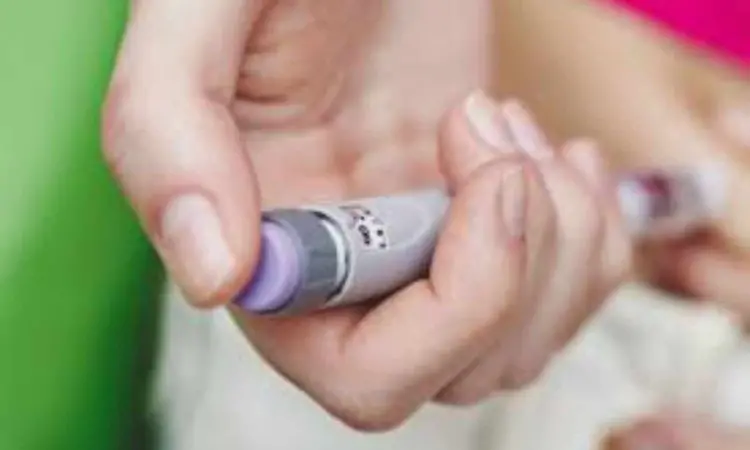- Home
- Medical news & Guidelines
- Anesthesiology
- Cardiology and CTVS
- Critical Care
- Dentistry
- Dermatology
- Diabetes and Endocrinology
- ENT
- Gastroenterology
- Medicine
- Nephrology
- Neurology
- Obstretics-Gynaecology
- Oncology
- Ophthalmology
- Orthopaedics
- Pediatrics-Neonatology
- Psychiatry
- Pulmonology
- Radiology
- Surgery
- Urology
- Laboratory Medicine
- Diet
- Nursing
- Paramedical
- Physiotherapy
- Health news
- Fact Check
- Bone Health Fact Check
- Brain Health Fact Check
- Cancer Related Fact Check
- Child Care Fact Check
- Dental and oral health fact check
- Diabetes and metabolic health fact check
- Diet and Nutrition Fact Check
- Eye and ENT Care Fact Check
- Fitness fact check
- Gut health fact check
- Heart health fact check
- Kidney health fact check
- Medical education fact check
- Men's health fact check
- Respiratory fact check
- Skin and hair care fact check
- Vaccine and Immunization fact check
- Women's health fact check
- AYUSH
- State News
- Andaman and Nicobar Islands
- Andhra Pradesh
- Arunachal Pradesh
- Assam
- Bihar
- Chandigarh
- Chattisgarh
- Dadra and Nagar Haveli
- Daman and Diu
- Delhi
- Goa
- Gujarat
- Haryana
- Himachal Pradesh
- Jammu & Kashmir
- Jharkhand
- Karnataka
- Kerala
- Ladakh
- Lakshadweep
- Madhya Pradesh
- Maharashtra
- Manipur
- Meghalaya
- Mizoram
- Nagaland
- Odisha
- Puducherry
- Punjab
- Rajasthan
- Sikkim
- Tamil Nadu
- Telangana
- Tripura
- Uttar Pradesh
- Uttrakhand
- West Bengal
- Medical Education
- Industry
Voice-based AI app improves insulin dosage and diabetes management: JAMA

A recent voice-based conversational artificial intelligence (AI) application has demonstrated significant success in optimizing insulin therapy for patients with type 2 diabetes. The results of a randomized clinical trial which was conducted at four primary care clinics in an academic medical center were published in Journal of American Medical Association.
The trial was conducted from March 1, 2021 to December 31, 2022 and involved 32 adults with type 2 diabetes who required initiation or adjustment of once-daily basal insulin. The participants were divided into one receiving basal insulin management through the voice-based conversational AI application, and the other group receiving standard care. The primary outcomes of the study included the time to optimal insulin dose, insulin adherence and changes in a composite survey that measures diabetes-related emotional distress and attitudes toward health technology and medication adherence. Secondary outcomes focused on glycemic control and improvement.
The results found that the participants in the voice-based AI group achieved optimal insulin dosing more rapidly when compared to the standard care group (median, 15 days vs. >56 days). The AI group expressed significantly better insulin adherence with a notable mean difference of 32.7%. The study also found that participants using the AI application were more likely to achieve glycemic control and improvement, highlighting a considerable advancement in diabetes management.
The participants in the AI group experienced a decrease in diabetes-related emotional distress that was indicated by a change in composite survey scores. The findings suggest that voice-based digital health solutions can play a critical role in medication titration for individuals with type 2 diabetes. These results emphasize the potential of AI-driven solutions to empower patients in managing their conditions effectively.
Reference:
Nayak, A., Vakili, S., Nayak, K., Nikolov, M., Chiu, M., Sosseinheimer, P., Talamantes, S., Testa, S., Palanisamy, S., Giri, V., & Schulman, K. (2023). Use of voice-based conversational artificial intelligence for basal insulin prescription management among patients with type 2 diabetes: A randomized clinical trial. JAMA Network Open, 6(12), e2340232. https://doi.org/10.1001/jamanetworkopen.2023.40232
Neuroscience Masters graduate
Jacinthlyn Sylvia, a Neuroscience Master's graduate from Chennai has worked extensively in deciphering the neurobiology of cognition and motor control in aging. She also has spread-out exposure to Neurosurgery from her Bachelor’s. She is currently involved in active Neuro-Oncology research. She is an upcoming neuroscientist with a fiery passion for writing. Her news cover at Medical Dialogues feature recent discoveries and updates from the healthcare and biomedical research fields. She can be reached at editorial@medicaldialogues.in
Dr Kamal Kant Kohli-MBBS, DTCD- a chest specialist with more than 30 years of practice and a flair for writing clinical articles, Dr Kamal Kant Kohli joined Medical Dialogues as a Chief Editor of Medical News. Besides writing articles, as an editor, he proofreads and verifies all the medical content published on Medical Dialogues including those coming from journals, studies,medical conferences,guidelines etc. Email: drkohli@medicaldialogues.in. Contact no. 011-43720751


